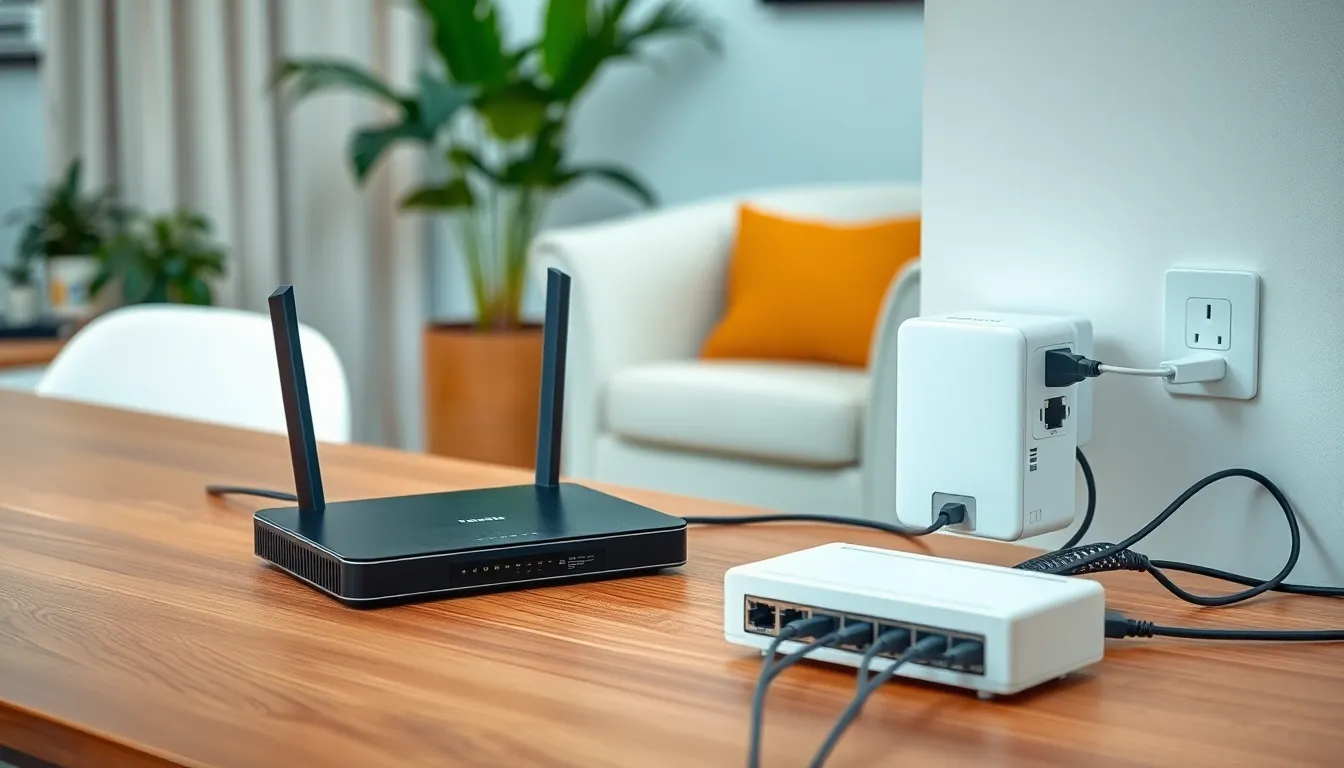Table of Contents
ToggleIn today’s digital age, a reliable home network is as essential as coffee on a Monday morning. Whether streaming the latest binge-worthy series or battling it out in online games, having the right tools can make all the difference. Imagine a world where buffering is a myth and dead zones are just urban legends.
Overview of Home Networking Tools
Home networking tools play a crucial role in establishing a robust network that meets modern demands. Routers direct internet connections, providing the necessary interface for all devices. Wireless access points extend coverage, eliminating dead zones throughout the home. Range extenders amplify signals, ensuring strong connectivity even in hard-to-reach areas.
Ethernet switches distribute connections among wired devices, facilitating reliable communication between computers and accessories. Network adapters enable devices without built-in network capabilities to access the internet, ensuring all equipment connects seamlessly. Firewalls offer protection from unwanted intrusions, enhancing overall security.
Quality of Service (QoS) settings prioritize bandwidth usage, improving performance for activities like streaming and gaming. Network monitoring tools provide insights into usage patterns and device connectivity, allowing for optimized settings. Powerline adapters utilize existing electrical wiring to establish network connections, creating alternatives where Wi-Fi signals falter.
Home automation systems integrate networking tools to manage connected devices, enhancing convenience and efficiency. Mesh networking systems work together to create an interconnected network, promoting consistent speeds across multiple locations. Adopting these essential tools fosters a reliable and high-performance home network.
Each component adds value, ensuring connectivity remains stable and fast. Selecting the right mix of home networking tools addresses specific needs, enhancing experiences for all users. Balancing security, speed, and coverage remains key for a seamless digital environment.
Types of Home Networking Tools

Home networking tools play a crucial role in establishing a reliable and efficient digital environment. This section outlines several essential types of tools for enhancing home networks.
Wireless Routers
Wireless routers serve as the central hub for home networks, directing internet connections to various devices. These devices create Wi-Fi signals, allowing smartphones, laptops, and smart TVs to connect without wires. Selection criteria include speed, range, and security features. High-quality routers support advanced protocols like Wi-Fi 6, which improves performance in busy households. Many models also offer parental controls and guest networks, providing added security and flexibility.
Range Extenders
Range extenders boost the wireless signal, ensuring coverage in areas where the Wi-Fi weakens. These devices capture the existing signal and retransmit it, eliminating dead zones common in larger homes. Installation of range extenders occurs easily through a plug-and-play process. Extenders come with dual-band capabilities, enhancing performance by effectively managing network traffic. Users seeking seamless connectivity in their outdoor spaces or remote rooms often benefit from integrating these tools.
Network Switches
Network switches facilitate communication among wired devices by connecting multiple ethernet cables. Businesses and home offices often use switches to improve network performance and reliability. These tools also prioritize data transfer speeds, reducing latency issues. Managed switches allow for increased control over network traffic and settings, enhancing security. Users planning to connect devices such as printers and gaming consoles can significantly benefit from the additional ports provided by switches.
Key Features to Consider
Considering key features enhances the effectiveness of home networking tools. Two major areas of focus include speed and performance, as well as security features.
Speed and Performance
Speed directly impacts the user experience. Faster speeds result in smoother streaming and gaming sessions. When selecting networking tools, look for routers that support Wi-Fi 6 to optimize speed. Performance also hinges on the number of connected devices. Tools with Quality of Service settings can prioritize bandwidth for essential applications, minimizing lag during peak usage. Additionally, consider the router’s range. Wider coverage ensures reliable connections throughout the home.
Security Features
Security protects sensitive information from unauthorized access. Advanced encryption standards, like WPA3, safeguard wireless networks. Firewalls serve as barriers against potential threats, while VPN capabilities enhance privacy by masking IP addresses. Features like guest networks allow temporary access without compromising the main network’s security. Regular firmware updates help patch vulnerabilities, ensuring ongoing protection. Ultimately, robust security features are crucial for maintaining a secure home networking environment.
Popular Home Networking Tools on the Market
Numerous home networking tools enhance connectivity and ensure fast internet access. These tools create a smooth online experience for various activities, from streaming to online gaming.
Reviews of Top Brands
Netgear offers reliable performance with routers supporting Wi-Fi 6. They provide features like advanced security and QoS settings. TP-Link stands out with affordable range extenders known for boosting signals effectively. Linksys delivers robust Ethernet switches, facilitating seamless communication among devices. ASUS combines gaming optimization with excellent wireless routers designed for high-speed connections. Each brand’s reputation is built on customer satisfaction, making them popular choices among users seeking dependable networking tools.
Comparison of Features
When comparing routers, consider speed ratings like AC1200 or AX6000 to gauge performance. TP-Link’s range extenders typically have straightforward setups, allowing users to quickly extend Wi-Fi coverage. Managed switches from Netgear enable users to monitor traffic flows effortlessly, enhancing overall network management. Security features such as WPA3 encryption found in Linksys products provide essential protection against unauthorized access. Gigabit ports on devices from ASUS aid in boosting wired connections for high-demand activities. Assessing these features helps users select tools that match their networking needs effectively.
Setting Up Your Home Network
Establishing a home network requires careful selection of various tools to ensure optimal performance. Start with a wired or wireless router, which acts as the central hub for directing internet connections. Ensure that the router supports high-speed protocols like Wi-Fi 6 to maximize connectivity.
Add range extenders to eliminate dead zones. These devices amplify wireless signals, providing comprehensive coverage throughout the space. Network switches connect multiple wired devices. Choose reputable managed switches for better control over traffic if connecting devices such as printers and gaming consoles.
Consider implemented security features. Firewalls add an essential layer of protection against unauthorized access. Opt for routers with advanced encryption standards such as WPA3 to safeguard sensitive information.
Utilize Quality of Service (QoS) settings, allowing specific devices to receive priority bandwidth for activities demanding higher performance like streaming and gaming. This function enhances the overall user experience by minimizing lag during crucial moments.
Incorporate networking tools into your setup according to personal needs. Network monitoring tools can help track performance and optimize settings effectively. Powerline adapters serve as an alternative connection method by using existing electrical wiring.
Take advantage of mesh networking systems for larger homes. These systems create seamless coverage across multiple locations, ensuring stable speeds for various devices without interruptions.
Select top-rated brands known for reliability. Netgear offers robust routers, while TP-Link provides effective range extenders at affordable prices. For Ethernet switches, Linksys stands out, and ASUS combines high speed with gaming optimization, catering to gamers’ unique requirements. Each brand maintains a solid reputation for customer satisfaction and quality.
Investing in the right home networking tools is crucial for creating a seamless digital environment. By selecting high-quality routers, range extenders, and switches, users can enhance their online experiences significantly. The right combination of tools not only improves speed and performance but also ensures robust security.
As technology continues to evolve, staying informed about the latest networking solutions will help users adapt to their growing connectivity needs. A well-structured home network can eliminate frustrating dead zones and buffering issues, making streaming and gaming more enjoyable. Prioritizing reliable brands and understanding essential features will lead to a secure and efficient home network that meets modern demands.





